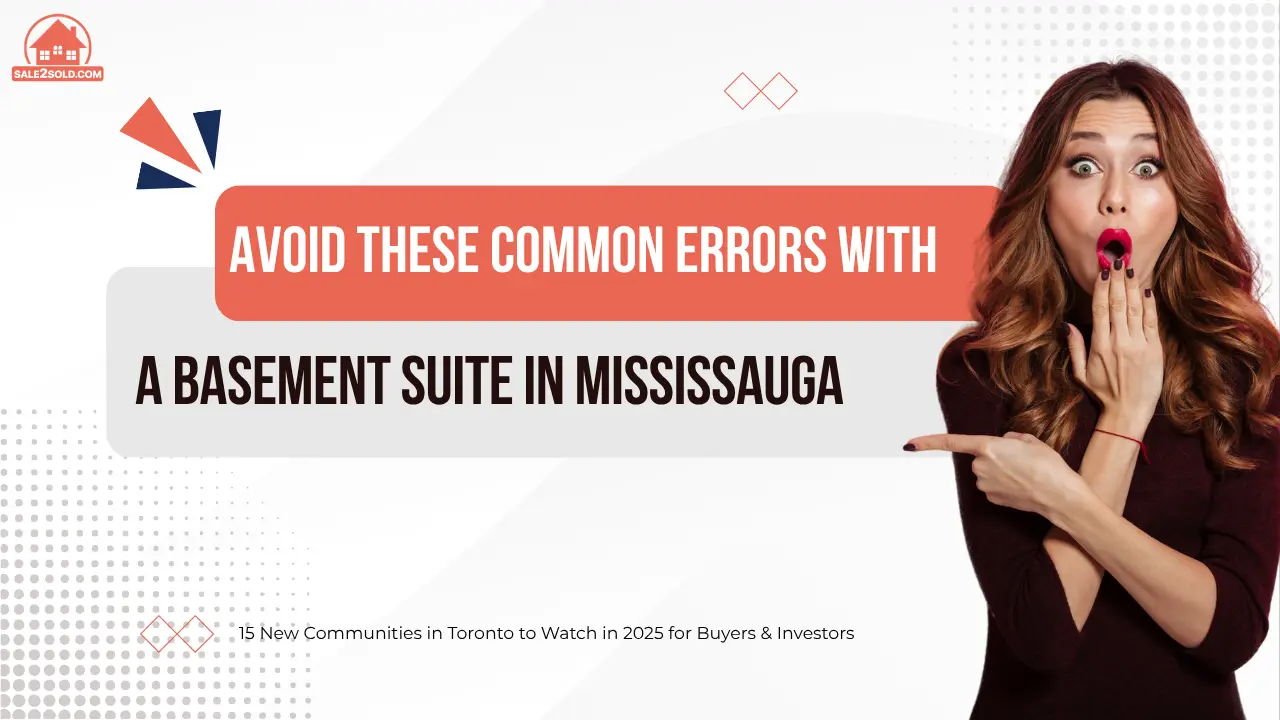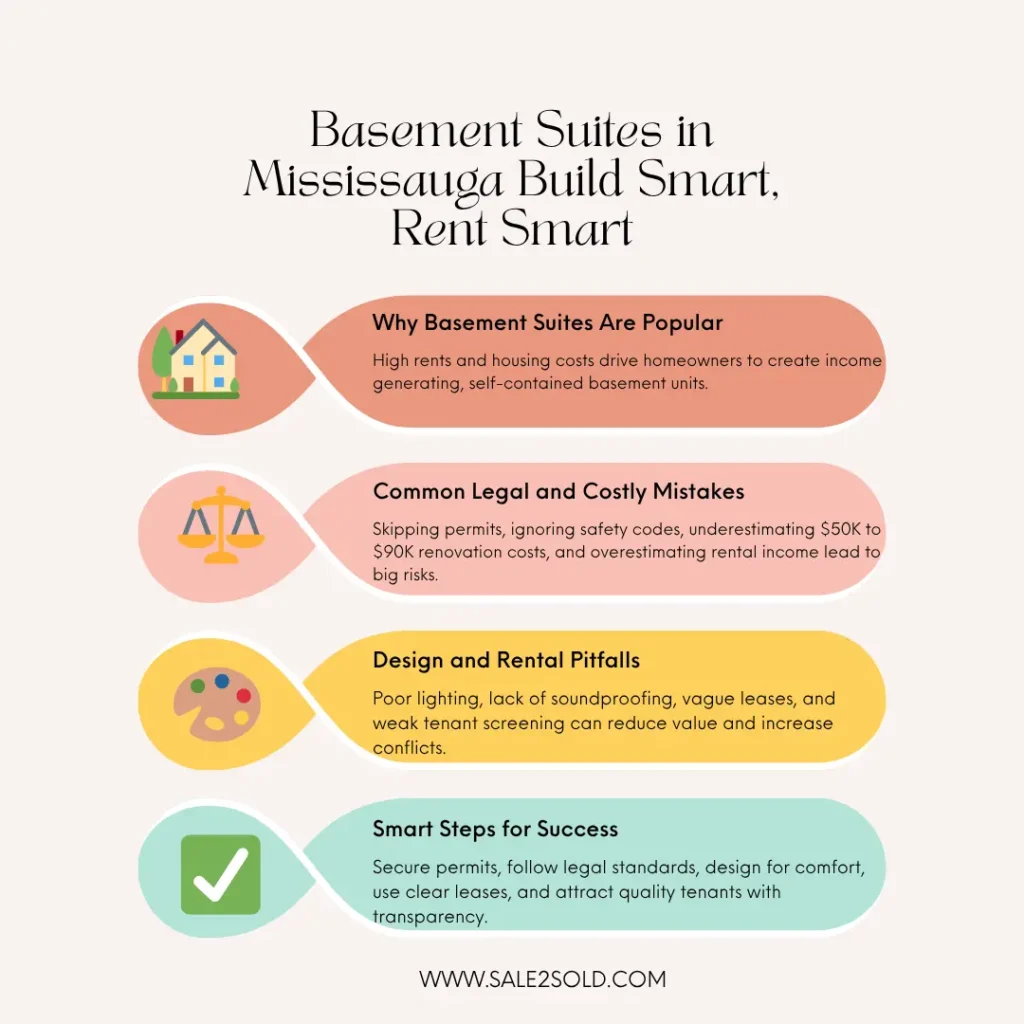Avoid These Common Errors with a Basement Suite in Mississauga


Thinking of adding a basement suite to your home in Mississauga? Or maybe you have already got one and you are planning to rent it out?
You are not alone. In a city where home prices and rents continue to climb, more homeowners are turning to basement suites as a smart way to generate extra income or house extended family. However, here is the truth: just because everyone is doing it does not mean everyone is doing it right.
From legal issues to costly construction mistakes and tenant troubles, there are plenty of ways a basement suite can backfire if you are not careful. So, let us walk through the most common errors and how you can avoid them with real insights and advice you will not find on a generic checklist.
Table of Contents
ToggleAt its core, a basement suite is a self contained living space located in the basement of a home. It typically includes a bedroom, bathroom, kitchen, and a separate entrance. In some cases, it may even have its own laundry, parking spot, and mailbox. People also refer to these as secondary suites, in law suites, or basement apartments.
Now here is why basement suites are booming in Mississauga:
Moreover, for homeowners, it is one of the few ways to offset that hefty mortgage.
Expert Insight: “Mississauga’s zoning laws have gradually opened up to allow more basement suites, but it does not mean it is a free for all,” says Paul Fernandes, a licensed contractor and second unit compliance specialist in the GTA. “Most people do not realize how many rules are involved until it is too late.”
According to a 2024 CMHC report, more than 30% of rental listings in Peel Region include some form of basement suite or secondary unit. The demand is clear, but there is a right and wrong way to approach it.
Let us be blunt: just because you can build or rent out a basement suite does not mean it is legal by default.
Mississauga (like most cities in Ontario) has strict building codes, zoning regulations, and fire safety standards that must be met. Moreover, if you ignore those rules, you could end up facing massive fines, denied insurance claims, or being forced to evict your tenant and shut the basement suite down altogether.
Here are the big ones people miss:
Real Talk: A homeowner in Cooksville was fined over $10,000 after a fire inspection revealed his tenant’s basement suite had no fire separation and no second exit. He also lost his insurance coverage because the suit was illegal.
According to a 2023 Ontario housing report, only 41% of basement suites in Ontario are fully legal. The rest exist in a gray area, and many owners do not even know it.
Let us talk numbers.
Converting your basement into a livable, legal basement suite costs more than most people expect. If you are budgeting $20k for a DIY job with a handyman, you are in for a surprise once inspectors show up.
A proper basement suite renovation in Mississauga typically costs between $50,000 to $90,000, depending on layout, permits, HVAC, and finishing. Moreover, that is before things like upgraded panels, engineering, or plumbing work.
Common budget mistakes:
Pro Tip: “Just because someone is renting a suite for $2,000 on Facebook does not mean you can,” says Karen Lee, a Mississauga investor. “Do your homework, use real data.”
As of early 2025, a legal one bedroom basement suite in Mississauga typically rents for $1,400 to $1,800/month. Walkout units or furnished suites may command even more.
Even with permits in hand, a poorly designed basement suite can sit vacant.
Here is what turns renters off:
Design Insight: “People underestimate how much things like noise and lighting affect basement living,” says Raj Malhotra, a small space interior designer. “Even simple upgrades like insulation and pot lights make a big difference.”
If your basement suite does not feel private, clean, and livable, you will either have to drop the rent or struggle to rent it at all.
Let us say you have a legal, well built basement suite. Great! However, now you need to rent it out the right way.
This is not a handshake deal. Under Ontario’s Residential Tenancies Act, even a tenant in your basement suite has full legal protection. That means:
Avoid these mistakes:
If your basement suite is attached to your own living space, clarity in the lease is critical to avoid problems down the road.
If you are shopping for a home that includes a basement suite, pause and ask questions.
Just because it is there does not mean it is legal or insurable.
Checklist before you close:
Pro Insight: “I have seen buyers count on income from a basement suite, only to find out after closing they cannot legally rent it,” warns Michael Dobson, Royal LePage broker. “It completely changes the ROI.”
Some lenders will not consider rental income unless the basement suite is fully legal and compliant.
Once your unit is ready, you want to attract quality tenants and avoid constant turnover.
Here is what helps:
Especially in hot rental areas like Churchill Meadows or Erin Mills, a well maintained basement suite can rent quickly if it feels like a proper home.
A well built, legal basement suite in Mississauga can help ease your mortgage burden and increase your home’s value, but only if you do it right from day one.
Cutting corners might save a few bucks upfront, but the risk of fines, vacancy, or legal disputes simply is not worth it.
If you are unsure, start with these steps:
Because peace of mind, especially with tenants in your home, is worth every dollar.